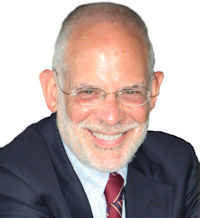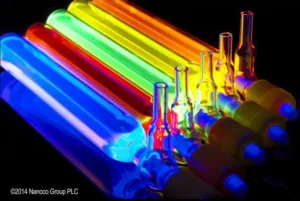Two weeks ago in this space I reported on an extensive conversation with Michael Edelman, CEO of the UK-based quantum-dot developer Nanoco (accent on the second syllable according to Edelman.) During that conversation, Edelman emphasized the importance of the licensing agreement Nanoco recently inked with the Merck Group.

I ended that column cautiously, suggested that the agreement would indeed be significant if Merck were taking the technology seriously rather than just putting a toe in the water (as certain Asian companies are known to do). I can now report that Merck is serious. Very serious.
The day before yesterday (November 22), I had a two-hour, face-to-face meeting with Robert Miller, Senior Business Manager for LC and Advanced Technologies Performance Materials at EMD Performance Materials (a U.S. Merck subsidiary located in Billerica, Massachuseets). Miller made it clear that what he would say had been approved by Merck in Darmstadt and was very much on the record.
Merck expects to complete the transfer of Nanoco’s material and manufacturing technology by the end of 2016, and then quickly move on to develop volume manufacturing processes. The company is considering where it would make the most sense to build a volume manufacturing facility. Merck feels it understands the required processes very well, and they are suggesting a schedule for building the plant that is so aggressive I won’t repeat it.
Merck and Nanoco are not the only quantum-dot companies in the news this week. Two apparently independent sources report that Samsung is acquiring quantum-dot and quantum-dot-optic maker QD Vision. I have not spoken to either of these sources directly and, at the moment, I would prefer to characterize this as a well-sourced rumor rather than a confirmed story. Still, it is logical.
QD Vision and Samsung?
QD Vision has been going downhill fast, but it has important IP relevant to quantum-dot materials that can be deposited (some day, perhaps) directly on LED chips. Even more interesting, QD Vision has been the leader in developing technology for exciting quantum dots with an electric field (as is done with OLEDs) rather than by photo-excitation as is done in today’s quantum-dot-enhanced backlights. Such QLEDs — the name has been patented by QD Vision — is today’s favorite candidate for the “ultimate display.”
Samsung has never really felt that OLED-TV was ready to be a commercial product. They were led to the water’s edge a couple of time as a result of the pressure from LG but they always backed away in time. During the most recent return to sanity, earlier this year, Samsung said they would develop advanced LCD TVs until QLED was ready.
A TV technology roadmap/timeline seems to be developing with interesting consistency across several sources: 1) quantum-dot-enchanced backlights (now), 2) quantum-dot color “filters,” and 3) QLED television displays (perhaps 10 years from now).
A Samsung acquisition of QD Vision makes sense, but let’s wait for an official statement before we say it’s real.
With Merck/Nanoco not yet in production, Dow Chemical/Nanoco still not in production 3½ years post-agreement, and QD Vision nearly out of the TV picture, Nanosys is now left with over 90% of the quantum-dot market and seems to be making the most of it.
QMC is a New Name
Quantum Materials Corp. (QMC) has a respected new CEO in Sri Peruvemba, who knows his company must overcome a legacy of shifting strategies and unfulfilled promises. Peruvemba seems genuinely optimistic, with the optimism based on developments he can not reveal. Yes, I know. But when there’s a story to tell, we’ll tell it. Given that I know very little about QMC’s current materials set, I am left with the feeling, at least for now, that the company’s continuous reactor processing may be it’s biggest asset. Everyone else makes quantum does with a batch process.
With that comment, let me return to Merck/EMD’s Robert Miller, who told me that Merck is now producing some LCD materials with a continuous process. Chemical companies love that. – Ken Werner
Ken Werner is Principal of Nutmeg Consultants, specializing in the display industry, manufacturing, technology, and applications, including mobile devices and television. He consults for attorneys, investment analysts, and companies re-positioning themselves within the display industry or using displays in their products. You can reach him at [email protected].

